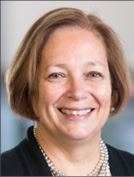Leading Change in Radiology
As I begin my year as president of RSNA, I am reminded of all the contributions RSNA, its volunteers and staff make to our profession — in North America and the world.

I attended my first RSNA annual meeting in Dallas in 1980 as a third-year radiology resident. There were over 16,000 attendees and we overwhelmed the city. Since then, the meeting has expanded exponentially. Yes, it is a huge, complex meeting, but it remains the place to see colleagues (new and old), network with professionals with similar interests, learn the latest in research, and update one’s fund of knowledge. The RSNA annual meeting is the event I trust the most to keep me up-to-date, knowing that the quality of information is the highest possible. In this age of rapid change and 24/7 social media, with some sources having little regard for the truth, it is more important than ever to have a trusted source of information. RSNA provides the highest quality of education and actively supports the research and innovation that shape our daily practices. In addition, I am struck that RSNA represents a “safe harbor” of calm and reason in these days of seeming chaos. Personally, I don’t need sensationalism — I need a realistic approach to my professional world and I can count on RSNA to provide it.
In my presidential year, I will work to continue RSNA’s success as the preeminent source of education, research and innovation. We will continue to expand the annual meeting, including the Virtual Meeting, and provide world-wide access to education. RSNA will launch three new online journals in 2019, building upon the long history of publishing outstanding research in Radiology and education in RadioGraphics.
RSNA truly supports our future. The practice of radiology depends upon the innovations supported by the Research & Education (R&E) Foundation. RSNA is the largest financial supporter of the Academy of Radiology and Biomedical Imaging Research, which works with the National Institutes of Health, Congress and patient-advocate groups to increase funding for radiology and imaging-based intervention research.
RSNA also supports our academic societies, such as the Association of University Radiologists and its affinity groups, including the American Alliance of Academic Chief Residents in Radiology, Alliance of Clinician-Educators in Radiology, Alliance of Medical Student Educators in Radiology, Radiology Research Alliance, Radiology Alliance for Health Services Research as well as the Society of Chairs of Academic Radiology Departments and the Association of Program Directors in Radiology by providing administrative services. Private practice radiologists may question the value of this to them, but they should be mindful that these organizations help to provide the pipeline of their future colleagues.
RSNA provides leadership and management training, critically important for all members of the radiology health care team, through courses and online materials, as well as its sponsorship of the Academy of Radiology Leadership and Management (ARLM). The ARLM is a consortium of radiology organizations that provides programming to their members at no extra charge, leading to recognition for the individual’s professional development.
We live in a rapidly changing world. Almost every aspect of our lives is far different than just a decade ago. Medicine, and especially radiology, has seen an accelerated pace of change. Many people find it difficult to deal with change. You can count on RSNA to help you cope with the many changes in your professional world by providing realistic perspectives on new and upcoming developments, access to the latest in innovation and research in our field, and outstanding education to improve your daily practice. I can’t imagine a world without RSNA — and when I look back at my career, I will count my years of volunteer work with RSNA as the most professionally rewarding (and they have never paid me anything!).
Valerie P. Jackson, MD, is executive director of the American Board of Radiology. She is also the Eugene C. Klatte Professor Emeritus at Indiana University School of Medicine. She served on the RSNA Research & Education (R&E) Foundation Board of Trustees from 2009 to 2015 and joined the RSNA Board of Directors in 2012.